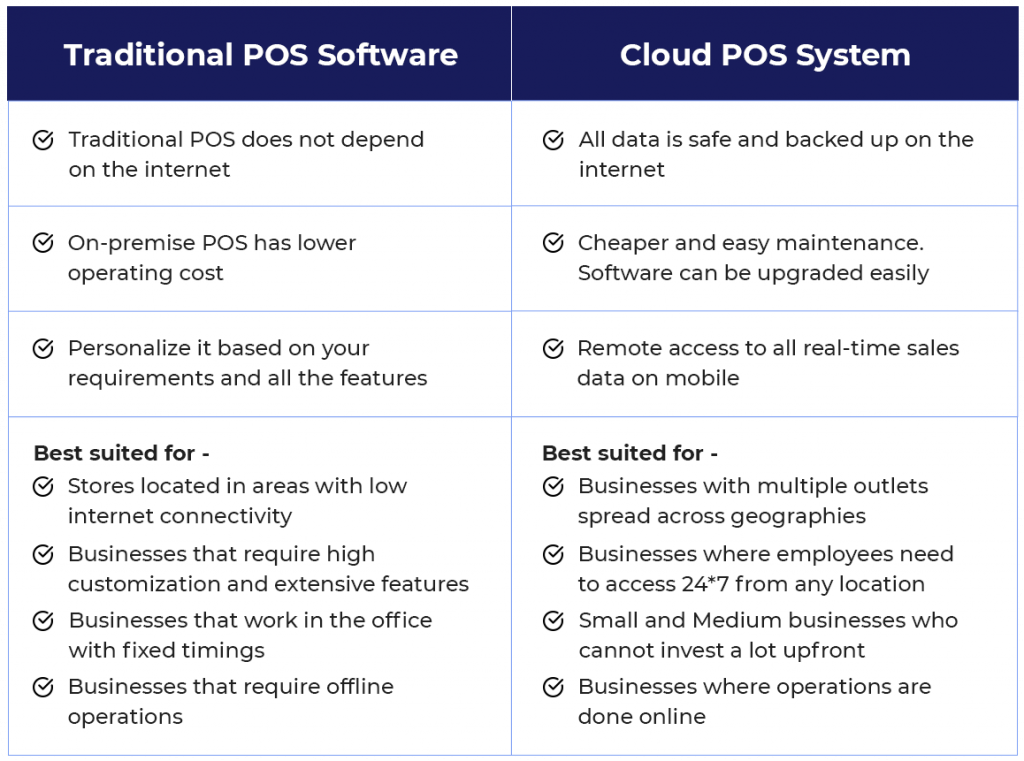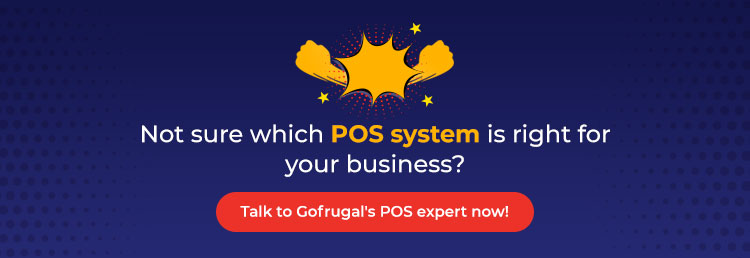
You might be a retailer, restaurateur, or distributor. One message that keeps bombarding you every now and then is – ‘Have you migrated to Cloud POS from your traditional POS, also called On-premise POS?’ It feels like a battlefield where two sides are screaming Cloud-based POS Vs Traditional POS. Why does migrating to cloud solutions seem to be the battle for the decade?
The answer is simple. We as a society have always migrated from legacy systems to cloud/digital solutions. Remember when we had telephones, and now there is no one without mobile phones. There was a time when we had to go to railway stations and book tickets. But now we get it done in just one click via booking online. As a society, we always move towards change and the advancements that drive it. Let’s dig deeper and understand what is all this battle about Cloud POS Vs Traditional POS.
What is On-premise POS?
On-premise POS or traditional POS is a type of POS where all your data is stored on a local database. Or even specifically, the data is stored in your computer’s hard drive. In this case, you can access the data by opening the POS application when you use your computer.
What is Cloud POS?
Cloud or Cloud-based POS is a type of POS where all your data and information are stored in an online server. Since it is stored online, you can access it anywhere using the Internet.
Here is where the battle starts Cloud POS Vs Traditional POS. Can you hear the battle cry already? Let’s march!
What are the advantages of Traditional POS?
On-premise POS does have some distinct advantages that it can bring to your business:
- Independence from the internet – Traditional POS does not depend on the internet. Once you install the device, you can access the system without using the internet.
- Lower operating cost – On-premise POS usually has one-time charges followed by maintenance charges. Since the entire system is designed just for your business, you just have to pay once for implementation, and it becomes your total asset.
- Extensive Display Setup – When you choose a traditional POS system, it is similar to purchasing a piece of furniture. The On-premise POS is a bit bulky with large screens. However, based on your demand, the On-Premise POS provides you with stable and easy-to-use features. Due to this, On-premise POS comes with high recommendations for retail stores, coffee shops, fast-food chains, and fine-dining restaurants.
What are the disadvantages of Traditional POS?
Traditional POS includes limitations that you need to consider before choosing it.
- Higher capital investment – The implementation cost of the Traditional POS is high. With On-premise POS, you need to make arrangements of system with required configuration. This includes additional hardware that needs to be compatible with the POS, which usually results in higher prices.
- Inability to access data on the go – Traditional POS does not rely on the internet. This means you cannot access it anywhere. You need to be present at the terminal if you have to do any transaction.
- Requires physical space – One major disadvantage of On-premise POS is that it requires considerable physical space. This could be challenging if you are operating in a limited office space.
The battle is heating up. We are not certain who is going to win. Traditional POS seems to be progressing forward now. But Cloud POS is not going to back down easily. Let’s leave the battlefield to them!
What are the advantages of Cloud POS?
Cloud POS offers many unique benefits, especially to small and medium businesses such as:
- Remote access – This is the highest benefit of using a Cloud POS. You can execute business operations anywhere anytime.
- Real-time sync – Cloud POS, in most cases, includes a real-time synchronization feature. With this feature, you can easily update data automatically. This comes in handy for retailers who use different sales channels.
- Data Security – With Cloud POS, all your data gets backed up online and stays there secured. Since all your data is backed up, there is no need to worry about losing data. When your device gets lost or broken or even after a cyberattack, you have nothing to worry about.
- Scalability – At the end of the day, any business owner just wishes for one thing. For continuous business growth and expansion. This also means that your POS system should scale up to match your business size. Cloud POS comes with inbuilt scalability. So, it is easy to scale up with less time, effort, and budget.
- Business insights – Cloud POS helps you track all transactions and lets you view information anywhere at any time. Based on these insights, you can make important decisions related to your business.
- Cost efficiency – Cloud POS has no hardware-related requirements. This will reduce the cost spent on other hardware that you spend while installing On-premise POS.
- No need for software update – Ideally in Cloud POS, there is no need of time to be invested on updating to latest software version. Cloud POS is always up-to-date!
- Better Performance – Application performance and responsiveness are better as the technology is updated and all information is stored on the cloud.
What are the disadvantages of Cloud POS?
Though Cloud POS has some huge advantages, it has some drawbacks such as:
- Less personalization – Due to the nature of the model, SaaS has limitations for customizations to the software. This may not be a major limitation that will affect small and medium retailers, as they have little to no time and money to spend on personalizing the POS colors and look. But larger retailers may prefer to go for tech that can be easily tailored to their brand and needs.
- Dependency on the internet – Cloud POS for sure needs a stable internet connection. An unstable Internet connection can cause service disruption. In the absence of the internet, you can not access your Cloud POS system. However, there are few cloud POS providers which provide offline support.
Uff! Looks like a tough battle. Isn’t it? One final round!
Comparison of Cloud POS Vs Traditional POS
Now comes the challenging part. What should I select? Here starts the real battle between Cloud POS Vs Traditional POS. Let’s look at the features and see which one is better.
Deployment:
If you choose a Cloud POS system, it is easy to access business data from any browser. In contrast, On-premise POS is physically located on the premises and can be accessed only by being physically present there.
Pricing:
The Cloud POS comes as a monthly subscription, and you can decide when to use it and cancel it. Whereas an On-premise usually comes with a one-time cost that must be paid upfront. It might be challenging to invest a massive amount in a technology when you do not know the outcome completely.
Security:
People tend to think an On-premise POS is more secure than the Cloud POS since the data is stored in your company’s hard drive. This means you have the risk of losing all the data in case of an accident or breach. But with Cloud POS, everything is stored in the Cloud, and you cannot lose the data.
Accessibility:
On-premise has restrictions on accessibility since it is limited to a physical location. But Cloud POS offers more accessibility and seamless mobile access. This is crucial in today’s world.

It does seem difficult. Why don’t we hear it from one of the battle survivors?
Let’s hear it from a customer!
Rahul Dubey, Account manager from Just Dogs, has been an active user of both our On-premise POS and Cloud POS. He says, ‘It clearly comes down to your requirements. When we had a single store, the On-premise POS was a good option. But as we scaled up and opened multiple branches across the country, we needed POS software that helped us stay connected and function without the limitations of a physical location. That’s when we migrated to RetailEasy on-cloud. We were happy with both On-Premise POS and Cloud POS, but for our requirements at this point and to scale up, Cloud POS seems to be a better option.’
Here, we have come to the end of the battle of Cloud POs Vs Traditional POS. There really is no winner of this battle. Both have their own advantages and disadvantages. It all comes down to a business’s requirements. Though Cloud POS has some outstanding and popular features, On-premise POS has its own features making it suitable to some business types who require their own customized POS system. Business owners should carefully examine which is the best POS system depending on the type of business, demands, and scale.
